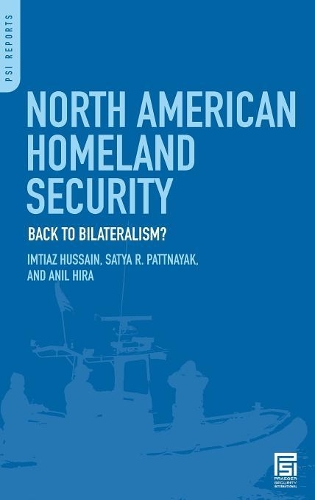
North American Homeland Security: Back to Bilateralism
(Hardback)
Publishing Details
North American Homeland Security: Back to Bilateralism
By (Author) Imtiaz Hussain
By (author) Satya R. Pattnayak
By (author) Anil Hira
Bloomsbury Publishing PLC
Praeger Publishers Inc
30th October 2008
United States
Classifications
Tertiary Education
Non Fiction
363.3456
Physical Properties
Hardback
344
Description
Did 9/11 revive a North American guns-butter trade-off Established in the largest administrative overhaul since World War II, the Department of Homeland Security was charged with keeping the United States safe within a wider security community, but confronted the Washington Consensus-based Western Hemisphere free trade movement, beginning with the North American Free Trade Agreement (NAFTA) and extending to the Central American Free Trade Agreement (CAFTA) in 2003, to materialize a Free Trade Area of the Americas (FTAA) compact. Whether 9/11 restrictions impeded these trade-related thrusts or not, embracing neoliberalism permitted Canada and Mexico to pursue their own initiatives, such as proposing free-trade to the USCanada in 1985, Mexico in 1990, but, as during the Cold War, security imperatives ultimately prevailed. This work investigates Canada's and Mexico's Department of Homeland Security responses through three bilateral studies of policy responses along comparative lines, case studies of security and intelligence apparatuses in each of the three countries, and a post-9/11 trilateral assessment. Ultimately, they raise a broader and more critical North American question: Will regional economic integration continue to be trumped by security considerations, as during the Cold War era, and thereby elevate second-best outcomes, or rise above the constraints to reassert the unquenchable post-Cold War thirst for unfettered markets replete with private enterprises, liberal policies, and full-fledged competitiveness
Reviews
Topics include how security considerations since the attacks of September 11, 2001, have impeded further economic integration. * The Chronicle Review *
This book is an interesting addition to the growing literature on the nature and effect of security alliances in an economically integrated world The authors posit that security will trump economic integration for the US and that this reprioritization will increase conflict between social groups within and among states Recommended. Graduate, faculty, and research collections. * Choice *
How has the security regime established in the United States in the wake of the September 11th, 2001, terrorist attacks impacted trade and other relations between the United States, Canada, and Mexico Hussain (international relations, U. Iberioamericana, Mexico), Pattnayak (sociology, Villanova U., US), and Hira (Latin American studies, Simon Fraser U., Canada) explore this question by first providing a country-specific study of 9/11 policy responses across North America, then examining the region's bilateral relations (particularly in reference to security and intelligence), and finally exploring trilateral possibilities. In exploring these issues, they rely on two major of clusters of theories: integrative (security and neofunctionalist) and hybrid (interdependence and neorealism). * SciTech Book News *
Author Bio
Imtiaz Hussain is Professor of International Relations at the Department of International Studies, Universidad Iberoamericana, Mexico City. His research and teaching interests range across the international relations spectrum, as have his publications. Originally from Bangladesh, he graduated from the University of Pennsylvania in Political Science, and has been at Universidad Iberoamericana since 1998. Satya R. Pattnayak is Professor of Sociology and Political Science and Director of Latin American Studies at Villanova University. Most recently, he has authored India as an Emerging Power (India Quarterly, 2007) and The Return of the State: Globalization, Capital, Coercion and Development (2006). Anil Hira is cross-appointed with Latin American Studies, and taught at the American University in Cairo and Tulane University before coming to Simon Fraser University. His research interests include international political economy, economic integration, energy deregulation, participatory governance, and fair trade. His geographical focus is on the MERCOSUR countries of South America. He is author of the books Ideas and Economic Policy in Latin America (1998) and Political Economy of Energy in the Southern Cone (2003).
